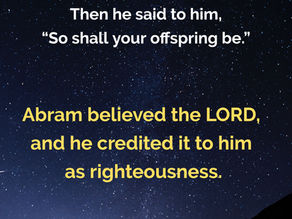Acts 11:15-18 - Who Do We Think We Are?
- Chad Werkhoven
- Sep 2, 2025
- 4 min read
Who are we to think that we could stand in God's way?

Acts 11:15–18 (NIV)
CONTEXT: This week we're working through selections from the book of Acts looking at examples of how God's grace is stronger than we are, and how it is that He produces both our will to believe and our very faith itself.
Here in Acts 11, Peter had gone into the house of a gentile - a Roman Centurion, no less - and had not just eaten with him and his household, but baptized them! Word of this spreads like wildfire in the Jewish-Christian community, and Peter faces criticism for it. We pick up the story here as Peter explains how the Holy Spirit had led him into the situation.
15 “As I began to speak, the Holy Spirit came on them as he had come on us at the beginning. 16 Then I remembered what the Lord had said: ‘John baptized with water, but you will be baptized with the Holy Spirit.’ 17 So if God gave them the same gift he gave us who believed in the Lord Jesus Christ, who was I to think that I could stand in God’s way?”
18 When they heard this, they had no further objections and praised God, saying, “So then, even to Gentiles God has granted repentance that leads to life.”
Canons of Dordt
Point 4 - Irresistible Grace
Article 13 & 14: The Incomprehensible Way of Regeneration and the Way God Gives Faith
In this life believers cannot fully understand the way this regeneration occurs;
meanwhile, they rest content with knowing and experiencing that,
by this grace of God,
they do believe with the heart and love their Savior.
In this way, therefore, faith is a gift of God,
not in the sense that it is offered by God for people to choose,
but that it is in actual fact bestowed on them,
breathed and infused into them.
Nor is it a gift in the sense that God bestows only the potential to believe, but then awaits assent—the act of believing—by human choice;
rather, it is a gift in the sense that God who works both willing and acting
and, indeed, works all things in all people and produces in them both the will to believe and the belief itself.
Summary
It had all made sense up to this point. It did seem strange that so many of them had rejected the grace that the Messiah had made possible, but the fact that God had fulfilled His covenant promises to His particular covenant people through Jesus resonated with those early Jewish Christians in Israel. Gentiles were still outsiders in the Kingdom, but God had once again saved His people, this time for all eternity. Things were the way they were supposed to be.
Until Peter had responded to that unexpected invitation, that is. It came out of the blue from Cornelius, who summoned Peter after meeting an angel in a vision (Acts 10). The angel told him that Peter would bring a message through which you and all your household will be saved (Acts 11:14). Peter, who'd experienced a vision of his own telling him to expect an invitation, wasted no time in responding.
It was as Peter spoke that the Holy Spirit showed up. That in itself isn't really a surprise, since the Bible makes it so clear that preaching is God's most ordinary means of grace - that is, the primary way God saves sinners. But it's the fact that Gentiles were baptized with the Holy Spirit that was so shocking.
Peter didn't miss the allusions to Pentecost. If God gave them the same gift He gave us who believed in the Lord Jesus Christ, Peter explains to his confused fellow Jews, who was I to think that I could stand in God's way?
Dig Deeper
Imagine if your most cherished cultural traditions were suddenly completely changed and upended: no more turkey on Thanksgiving, fireworks on the 4th of July, or going to Tim Hortons after a hockey game (sorry Canadian readers, it's the best I could come up with. Let me know in the comment box your favorite cultural tradition). Can you imagine the angst and anger that would erupt from such a sudden interruption of an age old way of life?
We can't begin to understand just how mind blowing and shocking this development was to those early Jewish Christians - it was miles (kilometers) beyond losing turkey, fireworks or Tim Horton! Certainly it would take months or years or even an entire generation to even begin to accept such a massive change. But that's not what we read here: When they heard this, they had no further objections and praised God.
What could have made such acceptance possible? None other than the same power of God, breathed and infused into them as the Canons put it, which had granted even the Gentiles repentance that leads to life!
The Canons explain that in producing both the will to believe and the belief itself, God works all things in us. Certainly the initial regeneration that brings a new Christian from spiritual death to life can only be accomplished by God's sovereignty, but that's just the beginning of God's regenerating power. God continues to powerfully guide us into His will all through our Christian life.
ACKNOWLEDGE WHO GOD IS: Our Father, who grants repentance that leads to life for all of His people;
ALIGN YOUR LIFE WITH GOD'S WILL: Pray that you would not stand in God's way, but would quickly align and conform your life to God's will as those early Jewish Christians did;
ASK GOD FOR WHAT YOU NEED:
Read the New Testament in a year! Today: 2 Corinthians 8



















Comments